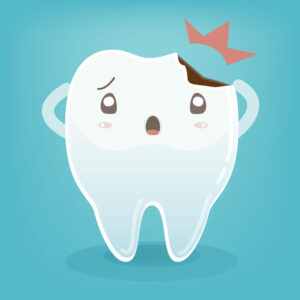Teeth are one of the strongest parts of your body, but it, too, has its limits. A sharp blow or excessive wear and tear can cause the teeth to chip or crack. It is also a fairly common experience for adults and children alike. However, the condition’s prevalence does not make it any less painful. Even if the damage is minor, you must visit the nearest dentist and get it fixed before it can escalate further.
Read through this blog to understand why chipped teeth occur and what you can do to prevent, treat and care for them.
Why Do Teeth Chip?
Getting a chipped tooth is painful. It is more painful when this happens with no fault on your part. You may wonder that despite exemplary oral practices, never missing your dental appointments, and taking care of your dietary needs, why were you the one to end up with a chipped tooth?

Sorry to disappoint, but a chipped tooth can happen to the best of us, and it has nothing to do with your dental practices. Here are a few common reasons that result in a chipped tooth.
- Biting down on a hard substance
- Chewing ice
- Sports Injury
- Road accident
- Teeth grinding
- Tooth decay
- Acid reflux
- Weak enamel
- Weak immunity
- Certain medications, including chemotherapy
- Diabetes
- Eating disorder
- Stress
- Using your teeth as a bottle opener
Poor dental care may significantly increase the risk of tooth chipping, but it is not the only factor. Your overall health and unpreventable falls or accidents are equal contributors to this particular dental issue. So, instead of beating yourself over how you got a chipped tooth, it will help to focus on how to fix it.
Treatment for Chipped Tooth
There are several cosmetic treatment options for healing a chipped tooth. The treatment usually depends on the position, severity, and symptoms of the chipped tooth. If the chip is minor and does not affect your eating and sleeping, it is not an emergency.
In any case, it is good to consult your cosmetic dentist at the earliest. It will help you avoid any further damage, infections, or future complications.

So, how does a dentist fix a chipped tooth? A minor chip is typically treated by smoothing and polishing the teeth. However, in case of severe damage, your dentist may choose from the following treatments depending on the situation.
Dental Veneers To Fix A Slightly Chipped Tooth
Dental Veneers – a cosmetic treatment, in simple language, are a thin coating covering the surface of your teeth, making them look brighter and feel stronger. It is the go-to solution for minor chips, especially on the surface of front teeth. A cosmetic dentist customizes the veneers to cover the entire surface of your teeth, matching them to your natural teeth color. Veneers not only cover the chip but also protect your enamel from further damage.
The treatment process for Dental Veneers is simple. Your dentist will take your dental impressions and schedule an appointment or two to finish fixing your smile.
Dental Filling or Dental Bonding for a Chipped Tooth
Another common cosmetic dentistry method to conceal and repair minor dental chips is dental bonding. It is a prevalent procedure to cover minor chips visible in your smile. So, What Is a Composite Filling: Procedure & Aftercare
Dentists prepare a composite filling matching your tooth color to fill the chip. The material blends in with your natural tooth, making the chip seem like ancient history. The procedure is quite simple and generally over in a single sitting. The dentist will glue the bonding piece to your chipped tooth and reshape it to blend in. They then harden and secure it with the help of UV light, and you are fit to go.
A Dental Cap Or Crown to Heal a Chipped Tooth
Teeth with severe chips due to an accident or tooth decay may need a bit more work. Your dentist may suggest dental crowns – a cosmetic dentistry procedure, as the preferred treatment to fix a chipped tooth in such cases.
The procedure involves filing down the chipped tooth and covering it up with a cap or a crown to protect the remaining original tooth from further damage. The cap restores the functionality as well as the appearance of your tooth.
Crowns come in different materials like metal, resin, or porcelain. All the materials are very functional with their own set of pros and cons. Your budget and the position of the chipped tooth play a vital role in the choice of material for the crown. While it is a little more invasive than dental bonding, the procedure is relatively pain-free. The procedure is complete in a couple of visits, leaving you with a happy and radiant smile.
Root Canal Therapy for Severely Chipped Teeth
Root Canal Therapy is an invasive cosmetic dentistry procedure done as a last resort to fix a chipped tooth and save your original tooth. In extreme cases, when the tooth pulp becomes visible due to the chip, the pain becomes unbearable, and there is a high risk of infection. In such cases, your endodontist suggests root canal treatment to remove the dead or rotten pulp and clean the canal before sealing it again. To protect the weakened tooth, the dentist will place a crown to protect the chipped tooth from further injury and restore the aesthetics.
Dental Implants
If the benign chip progresses into a severe infection due to carelessness, the bacterial infection can penetrate the root pulp and kill the nerve. There is no way to save your original tooth in such a situation. Tooth extraction is the only cosmetic dentistry procedure to stop the spread of infection.
After losing a tooth, the best way to restore your smile’s complete functionality and aesthetics is through dental implants. An implant will protect your facial structure by closing the gap left behind by the missing tooth.
So, want to fix a chipped tooth you got from an unfortunate accident or biting too hard? Worry not; our cosmetic dentistry experts are ready to sort you out and restore your radiant smiles here at Gardner Smiles! With our state-of-art technology and extensive cosmetic treatment experience, you will leave with a toothy grin!
How to Prevent Chipped Teeth?
As discussed previously, there are several factors contributing to a chipped tooth. Though you cannot foresee or prevent accidents, you can care for your oral health and keep a check on your diet. Here are some suggestions that can help prevent chipping due to health reasons:
- Brush twice a day or after meals.
- Floss every day.
- Visit the dentist annually for a checkup.
- Reduce stress to prevent teeth clenching.
- Wear a mouthguard when playing sports.
- Avoid very hard foods and never chew ice
- Sleep with a nightguard to stop bruxism.
- Seek medical help for any untreated eating disorder.
- Stop smoking
Although an experienced and skilled cosmetic dentist can restore any smile, prevention is still better than any cure. Keeping up with your regular dental checkup will facilitate an early diagnosis of any problem. Treatment at an early stage is easy and beneficial for your overall health and also more economical.
How to Care for a Chipped Tooth?
The first thing on your to-do list after getting a chipped tooth should be to schedule an appointment with your dentist. Waiting for too long is a sure sign of a mishap waiting to happen. Thankfully, chipped teeth are generally not a medical emergency, and you can take a few days to visit your dentist. Meanwhile, here are some tips to care for your tooth before your appointment.
- Rinse your mouth with warm saltwater to get rid of any bacteria or harmful pathogens.
- Reduce the pain, if any, with over-the-counter painkillers.
- Switch to soft foods so as not to aggravate the chipped tooth.
- Cover any jagged edges with dental wax or sugar-free gum to prevent further injury.
- If possible, save the broken pieces of the tooth by soaking them in warm milk. The dentist might be able to reattach the fragments.
- Use a cold compress to stop the bleeding and reduce the swelling. If the bleeding doesn’t stop, contact an emergency dental clinic, you might need stitches.
Should I Worry About a Chipped Tooth?
Though a slightly chipped tooth may not be a big deal initially, you should get it looked at by a dentist. Symptoms like pain, sensitivity, inflammation, or decay may arise after some time resulting in pain and discomfort. Also, bacteria might sometimes penetrate the chipped tooth into your dental cavity and cause gum infections.
Schedule your appointment with your dentist at Gardner Smiles, and our expert will discuss the best treatment plan to restore your beautiful smile.
Why is My Tooth Chipping Off?
Tooth chipping is a reasonably common occurrence and happens due to several reasons. It can result from biting in on very hard objects such as ice or using your tooth as a bottle opener. Common! You have got tools for it; use them! Apart from your mistakes, chipped teeth can also result from sports injuries or accidents.
However, it is essential to remember to take care of it afterward and contact your dentists as soon as possible. A minor chipped tooth might not be a problem, but leaving it untreated can escalate into serious issues.
Can a Cracked Tooth Repair Itself?
Yes, it is possible for a tooth to repair itself in case of minimal damage. If the crack is a minimal fracture line on the surface of the teeth that does not pain, it may repair itself. Again, there is no guarantee that it will do so. The process is called remineralization, and saliva plays a crucial role in it to help rebuild the enamel. However, the cracks you deem superficial might not be so in reality. Therefore it is better to be safe than sorry and consult the specialists.
Don’t make the mistake of avoiding a seamlessly minor crack or chip, and get it checked by a dentist before it’s too late. Book your appointment at Gardner Smiles to let the experts access your teeth and tell you the best way forward.





